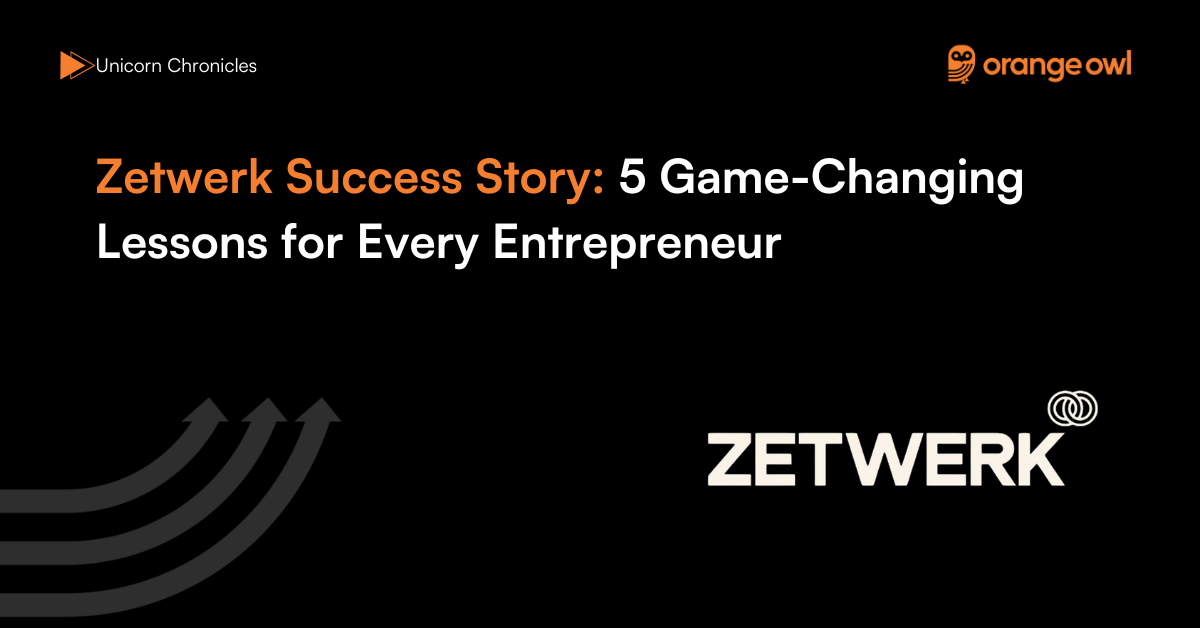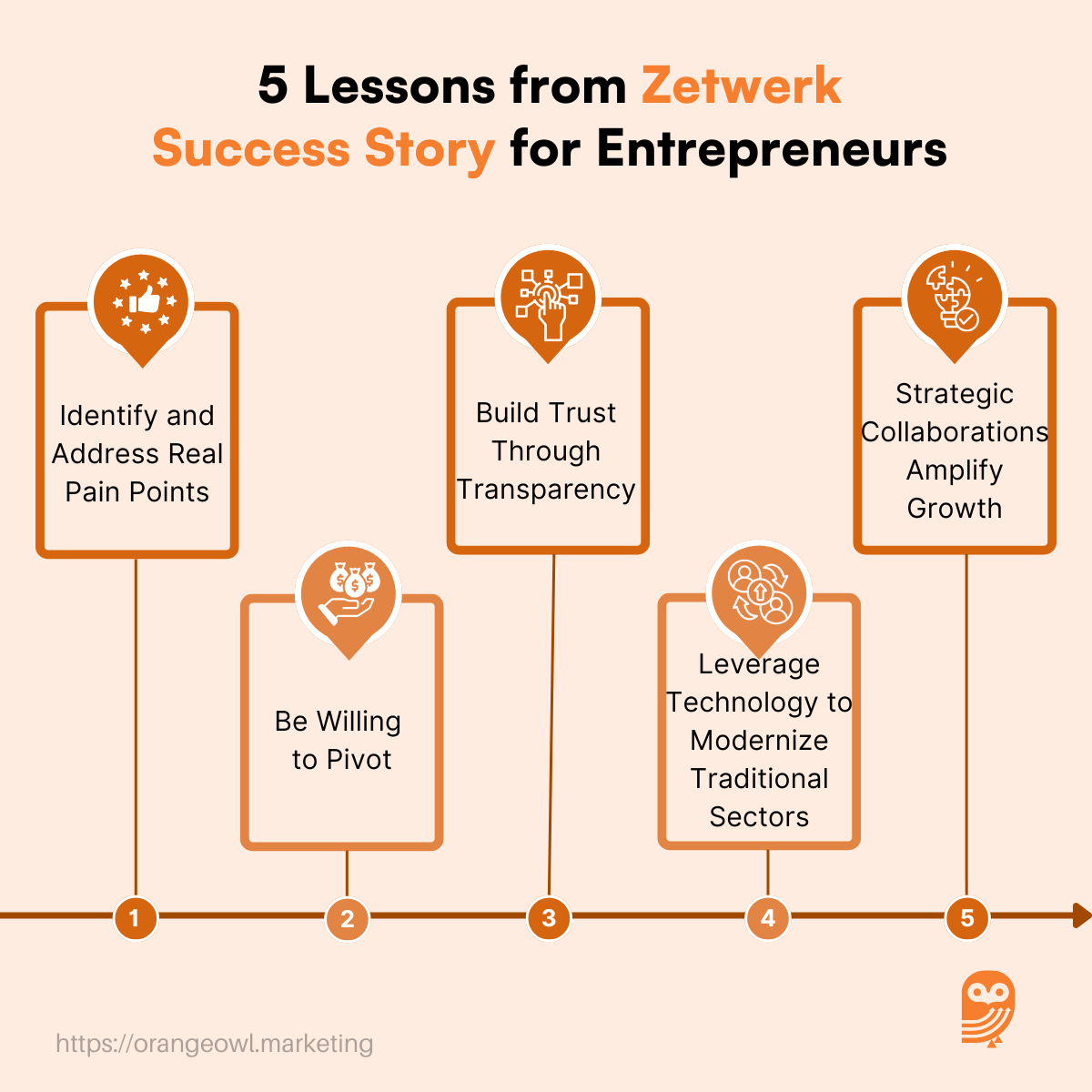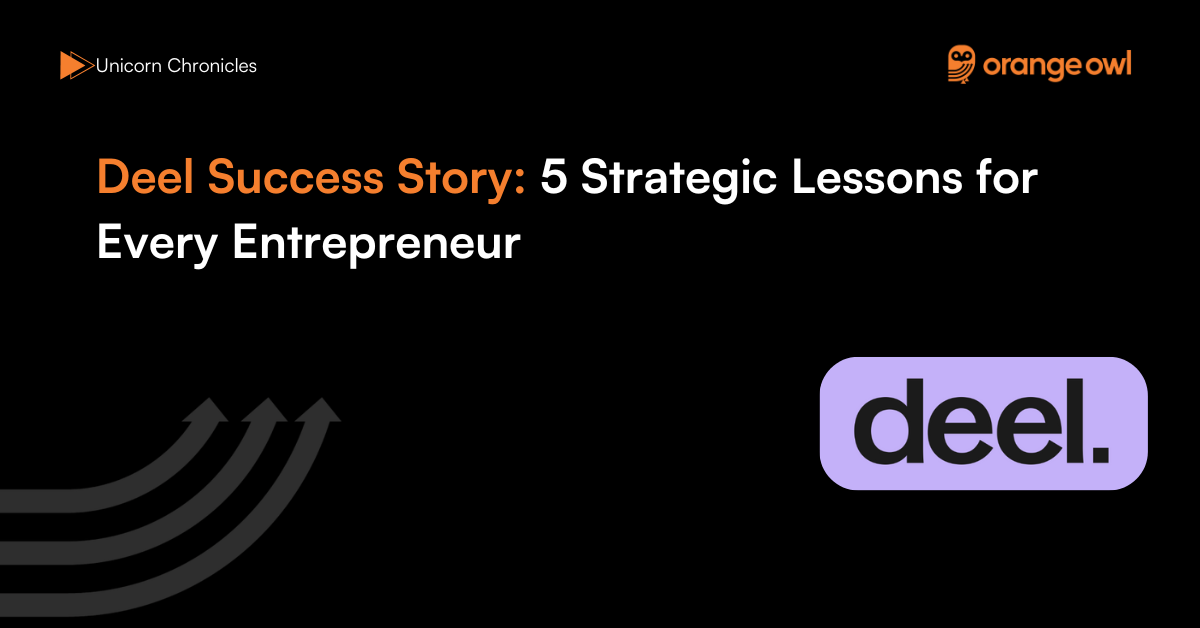Zetwerk Success Story: 5 Game-Changing Lessons for Every Entrepreneur
Vivek Goel
May 29, 2025

Table of Contents
Introduction
In the vast and often fragmented landscape of Indian manufacturing, Zetwerk has emerged as a game-changing disruptor, seamlessly bridging the long-standing gap between traditional industrial processes and contemporary digital capabilities. What began as a vision in 2018 has now scaled into a global B2B manufacturing powerhouse, revolutionizing how businesses procure and produce custom products.
Founded by a dynamic team — Amrit Acharya, Srinath Ramakkrushnan, Rahul Sharma, and Vishal Chaudhary — Zetwerk was built with one core mission: to streamline the complex and inefficient supply chains of the manufacturing world. The founders brought diverse yet complementary expertise to the table, from engineering and consulting to operations and technology. This multidimensional perspective enabled them to build a platform that addressed the root-level inefficiencies plaguing the sector.
At its core, Zetwerk acts as a digital bridge between demand and supply, connecting businesses across industries — such as aerospace, infrastructure, oil & gas, and renewables — with small and medium-scale manufacturers. By digitizing procurement, production tracking, and supplier discovery, Zetwerk has made manufacturing more accessible, transparent, and scalable than ever before.
Within just a few years, Zetwerk has not only scaled operations globally but also achieved unicorn status, with a valuation of over $2.7 billion. More than a success story, Zetwerk is a clear signal that India’s traditional sectors are ripe for innovation, and with the right technology and vision, they can become global leaders.
As the startup ecosystem continues to evolve, Zetwerk’s rise serves as an inspiring blueprint for how intentional innovation, operational excellence, and a user-first mindset can create long-lasting impact, not just in urban digital corridors but deep into the industrial heartlands of India and beyond.
Origin Story
The genesis of Zetwerk is deeply rooted in the founders’ firsthand encounters with the inefficiencies that plagued the traditional manufacturing sector in India. Co-founder Srinath Ramakkrushnan grew up witnessing the operational struggles of his father’s fabrication business in Coimbatore, where sourcing dependable suppliers and managing production deadlines were constant headaches. These challenges were not isolated incidents but emblematic of a broader systemic issue—a fragmented, opaque, and often unreliable supply chain.
This personal insight became the seed for a transformative idea. Alongside Srinath, co-founder Amrit Acharya brought a wealth of global business acumen gained during his tenure at consulting giant McKinsey & Company and further honed by his MBA from UC Berkeley. Together, they envisioned a solution that could leverage technology to streamline manufacturing procurement and operations.
Initially, Zetwerk was conceived as a SaaS (Software-as-a-Service) platform aimed at digitizing manufacturing workflows. However, the founders soon realized that the core problem was more foundational: the extreme fragmentation of the manufacturing supply chain itself. To address this, they pivoted to building a B2B marketplace that would directly connect businesses with verified manufacturers, thus bypassing inefficiencies in traditional procurement processes.
Reflecting on the company’s mission, Amrit Acharya said,
“We are deeply passionate about the problem statement. How do we transform India into a manufacturing superpower?”
This commitment to revolutionizing India’s manufacturing landscape became the driving force behind Zetwerk’s rapid growth and innovative approach.
Business Space and Early Challenges
Zetwerk operates at a unique intersection where technology meets manufacturing, redefining how custom products are sourced and produced. The platform aggregates a vast network of verified suppliers and manufacturers, enabling businesses to effortlessly procure components and custom products while ensuring strict quality standards and adherence to delivery timelines.
This model addresses a long-standing gap in the Indian industrial ecosystem—where procurement was traditionally manual, opaque, and fraught with inefficiencies. By digitalizing procurement workflows and introducing transparency, Zetwerk has empowered clients to make smarter sourcing decisions, while simultaneously offering manufacturers greater access to business opportunities.
However, the journey was not without hurdles. In its early days, Zetwerk encountered deep-rooted skepticism from both sides of the marketplace. Manufacturers, often small and family-run enterprises, were wary of digital platforms and reluctant to shift away from established personal relationships. Similarly, industrial clients accustomed to traditional procurement channels questioned the reliability and quality assurance of an online marketplace.
To overcome these challenges, Zetwerk placed immense emphasis on building trust. The company invested significantly in establishing rigorous quality assurance protocols to ensure that products met client specifications. Transparent communication became a cornerstone, with real-time updates and dedicated support teams fostering confidence among users. Moreover, strategic partnerships with reliable logistics providers ensured timely and safe delivery of complex industrial orders.
These combined efforts slowly but surely shifted market perceptions. What was once viewed as a risky experiment began to be seen as a dependable and efficient partner within the manufacturing ecosystem. Zetwerk’s ability to bridge trust gaps and demonstrate consistent value laid the groundwork for its exponential growth and market leadership.
Growth Strategies
Zetwerk’s meteoric rise in the manufacturing sector can be attributed to a series of well-executed strategic initiatives that allowed it to scale rapidly and diversify its offerings. Initially focusing on capital goods, Zetwerk strategically expanded into multiple high-growth industries such as aerospace, electronics, and renewable energy. This diversification not only allowed the company to tap into varied market demands but also helped mitigate risks associated with reliance on a single sector, establishing a strong foothold across multiple verticals.
Central to Zetwerk’s growth has been its commitment to technological integration. The development of the proprietary Zetwerk Operating System marked a significant milestone, offering clients real-time visibility into their production processes. This transparency not only enhanced operational efficiency but also fostered greater trust between manufacturers and buyers, a critical factor in the traditionally opaque manufacturing industry.
Recognizing the limitations of catering solely to the domestic market, Zetwerk also prioritized global expansion. By establishing a presence in international markets, the company positioned itself as a reliable partner for global clients seeking high-quality manufacturing solutions. This global outreach broadened its revenue streams and showcased the scalability of its platform beyond India.
Moreover, strategic partnerships with established industrial giants such as Tata Steel and Larsen & Toubro (L&T) have been pivotal. These collaborations bolstered Zetwerk’s credibility and operational capabilities, enabling it to manage larger and more complex orders. Partnering with such reputable firms also opened doors to new business opportunities and industry networks, accelerating Zetwerk’s growth trajectory.
Marketing Strategies
Zetwerk’s marketing approach has been thoughtfully crafted to build brand authority and expand its user base effectively. One of the cornerstones of its strategy has been establishing thought leadership by sharing in-depth insights into manufacturing trends, challenges, and innovations. Through whitepapers, webinars, and industry discussions, Zetwerk positioned itself not just as a service provider but as an expert voice shaping the future of manufacturing.
Highlighting success stories and client testimonials played a crucial role in humanizing the brand and demonstrating tangible value. By showcasing real-world examples of how businesses achieved efficiency and growth through Zetwerk’s platform, the company built trust and credibility among potential users, many of whom were initially hesitant to embrace digital manufacturing solutions.
To reach a broader audience and educate them on modern manufacturing practices, Zetwerk leveraged a variety of digital outreach initiatives. These included targeted social media campaigns, informative blog posts, and video content that simplified complex industrial processes and showcased the benefits of their platform. This digital presence allowed Zetwerk to engage directly with decision-makers across industries, effectively expanding its reach and fostering community engagement.
5 Game-Changing Lessons for Every Entrepreneur
1. Identify and Address Real Pain Points
Zetwerk’s success highlights the critical importance of focusing on real, tangible problems rather than superficial market trends. The founders recognized deep-rooted inefficiencies in the manufacturing procurement process — a sector traditionally burdened with fragmented supply chains, lack of transparency, and delays.
By zeroing in on this core pain point and developing a solution that directly addressed these challenges, Zetwerk tapped into a significant unmet market need. This approach underscores that successful entrepreneurship often begins with identifying genuine problems that impact a large audience and offering practical, scalable solutions.
2. Be Willing to Pivot
The founders of Zetwerk originally conceptualized the business as a SaaS platform, but early experiences and market feedback led them to pivot to a B2B marketplace model. This shift was critical to directly solving the fragmented supply chain problem, enabling manufacturers and buyers to interact more efficiently.
This adaptability shows that flexibility is a vital trait for startups; being open to revisiting and revising your business model based on customer needs and market realities can be the difference between failure and success. Entrepreneurs should embrace pivoting as a natural part of growth and continuous improvement.

3. Build Trust Through Transparency
In industries like manufacturing, where procurement involves large investments and complex logistics, trust becomes a cornerstone of long-term success. Zetwerk tackled this challenge by developing systems that provide clients with real-time visibility into their production processes through the Zetwerk Operating System.
This transparency not only reassured clients about quality and timelines but also fostered stronger partnerships. For entrepreneurs, this lesson illustrates that building trust isn’t just about delivering a product or service; it’s about creating clear, open communication channels that make customers feel informed and confident at every stage.
4. Leverage Technology to Modernize Traditional Sectors
Zetwerk’s integration of advanced technology into a conventional, often manually managed industry is a prime example of how digital innovation can revolutionize traditional sectors. By automating workflows, enabling real-time data tracking, and streamlining supplier discovery, technology enhanced operational efficiency and scalability.
This lesson reminds entrepreneurs that even industries perceived as “old-school” have immense potential for disruption and modernization. Leveraging the right tech solutions can unlock new value, create competitive advantages, and open up untapped market opportunities.
5. Strategic Collaborations Amplify Growth
Zetwerk’s partnerships with established industry giants like Tata Steel and L&T were instrumental in accelerating its growth and expanding its market presence. These collaborations brought credibility, resources, and access to wider networks, allowing Zetwerk to handle more complex projects and scale faster.
This shows that while building a strong internal foundation is important, strategic external partnerships can act as powerful growth multipliers. Entrepreneurs should proactively seek out collaborations that complement their strengths, open new markets, and enhance their brand’s trustworthiness.
Conclusion
Zetwerk’s remarkable journey from a fledgling startup to a manufacturing unicorn stands as a powerful testament to how innovation, adaptability, and strategic execution can transform even the most traditional sectors. By identifying and tackling the deep-rooted inefficiencies in the manufacturing supply chain, the founders not only addressed a pressing industrial challenge but also created a scalable, technology-driven platform that bridges manufacturers and businesses across the globe. Their ability to pivot quickly, invest in transparency through cutting-edge systems, and forge meaningful partnerships has been instrumental in scaling Zetwerk’s operations and reputation.
More than just building a successful company, Zetwerk’s vision goes beyond business metrics—it aims to revolutionize India’s manufacturing landscape and position the country as a global superpower in production. As co-founder Amrit Acharya powerfully expresses, “We are deeply passionate about the problem statement. How do we transform India into a manufacturing superpower?” This commitment to a larger purpose, combined with relentless execution, has made Zetwerk a beacon of inspiration for entrepreneurs striving to modernize traditional industries through technology and innovation.
For startups and business leaders alike, Zetwerk’s story underscores that with clarity of vision, customer-centric innovation, and strategic partnerships, even the most entrenched sectors can be reimagined and elevated to new heights.


